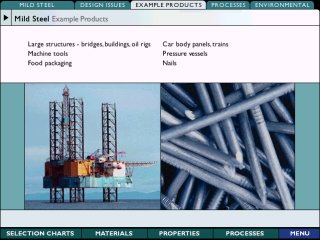The TEP Package
Software Selection Tool - Materials
There are over 40
materials included in the software, grouped into 5 classes,
providing a wealth of information.
There are 2 levels of information, one for
material classes and one for individual materials.
The information on material classes is split into
2 sections:
A description of the
general characteristics of the class
A table of process compatibilites
detailing how suitable the class is for manufacturing
with the various processes included in the processes area.
The information on individual materials is split
into 5 sections:
- An overview giving useful general
information about the material
- Design issues detailing the specific
strengths and weaknesses of the material in a design
context
- A list of example products made with
this material and some representative pictures.
- A table of process compatibilites
detailing how suitable the material is for manufacturing
with the various processes included in the processes area.
- Some of the important environmental issues
associated with the material.
Materials included:
- Metals and alloys: Mild Steels, Alloy Steels,
Stainless Steels, Cast Iron, Aluminium alloys, Copper,
Brasses, Nickel alloys, Titanium alloys, Magnesium
alloys, Zinc, Lead, Gold
- Ceramics: Glasses, Alumina, SiC, Silicon,
Diamond, Zirconia
- Porous Ceramics: Brick, Porcelain, Concrete
- Polymers: Polythene, Polystyrene, Polypropylene,
PMMA, Polycarbonate, PVC, ABS, Nylon, PET, Urea
Formaldehyde, Polymer foams, Rubber
- Composites: GFRP, CFRP
- Wood and wood products: Pine, Balsa, Oak, Medium
density fibreboard (MDF), Paper
 Return to overview of TEP
software selection tool
Return to overview of TEP
software selection tool
Last updated: 17/03/2000. Please email any comments to: Andrew Lovatt

![]() Return to overview of TEP
software selection tool
Return to overview of TEP
software selection tool